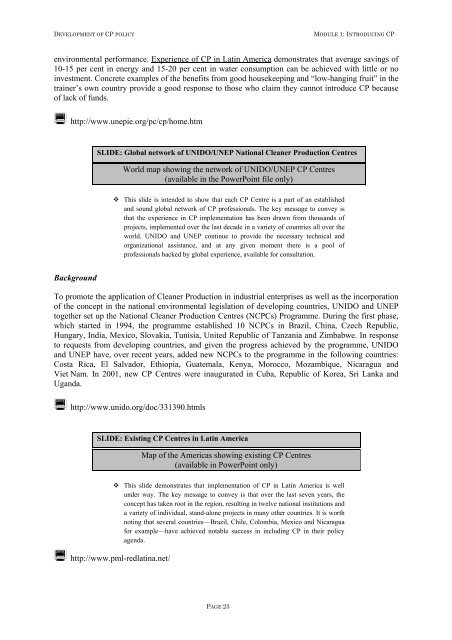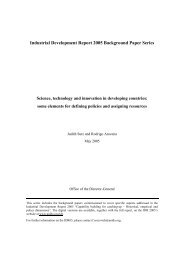Manual on the Development of Cleaner Production Policies ... - Unido
Manual on the Development of Cleaner Production Policies ... - Unido
Manual on the Development of Cleaner Production Policies ... - Unido
You also want an ePaper? Increase the reach of your titles
YUMPU automatically turns print PDFs into web optimized ePapers that Google loves.
DEVELOPMENT OF CP POLICY<br />
MODULE 1: INTRODUCING CP<br />
envir<strong>on</strong>mental performance. Experience <strong>of</strong> CP in Latin America dem<strong>on</strong>strates that average savings <strong>of</strong><br />
10-15 per cent in energy and 15-20 per cent in water c<strong>on</strong>sumpti<strong>on</strong> can be achieved with little or no<br />
investment. C<strong>on</strong>crete examples <strong>of</strong> <strong>the</strong> benefits from good housekeeping and “low-hanging fruit” in <strong>the</strong><br />
trainer’s own country provide a good resp<strong>on</strong>se to those who claim <strong>the</strong>y cannot introduce CP because<br />
<strong>of</strong> lack <strong>of</strong> funds.<br />
http://www.unepie.org/pc/cp/home.htm<br />
SLIDE: Global network <strong>of</strong> UNIDO/UNEP Nati<strong>on</strong>al <strong>Cleaner</strong> Producti<strong>on</strong> Centres<br />
World map showing <strong>the</strong> network <strong>of</strong> UNIDO/UNEP CP Centres<br />
(available in <strong>the</strong> PowerPoint file <strong>on</strong>ly)<br />
This slide is intended to show that each CP Centre is a part <strong>of</strong> an established<br />
and sound global network <strong>of</strong> CP pr<strong>of</strong>essi<strong>on</strong>als. The key message to c<strong>on</strong>vey is<br />
that <strong>the</strong> experience in CP implementati<strong>on</strong> has been drawn from thousands <strong>of</strong><br />
projects, implemented over <strong>the</strong> last decade in a variety <strong>of</strong> countries all over <strong>the</strong><br />
world. UNIDO and UNEP c<strong>on</strong>tinue to provide <strong>the</strong> necessary technical and<br />
organizati<strong>on</strong>al assistance, and at any given moment <strong>the</strong>re is a pool <strong>of</strong><br />
pr<strong>of</strong>essi<strong>on</strong>als backed by global experience, available for c<strong>on</strong>sultati<strong>on</strong>.<br />
Background<br />
To promote <strong>the</strong> applicati<strong>on</strong> <strong>of</strong> <strong>Cleaner</strong> Producti<strong>on</strong> in industrial enterprises as well as <strong>the</strong> incorporati<strong>on</strong><br />
<strong>of</strong> <strong>the</strong> c<strong>on</strong>cept in <strong>the</strong> nati<strong>on</strong>al envir<strong>on</strong>mental legislati<strong>on</strong> <strong>of</strong> developing countries, UNIDO and UNEP<br />
toge<strong>the</strong>r set up <strong>the</strong> Nati<strong>on</strong>al <strong>Cleaner</strong> Producti<strong>on</strong> Centres (NCPCs) Programme. During <strong>the</strong> first phase,<br />
which started in 1994, <strong>the</strong> programme established 10 NCPCs in Brazil, China, Czech Republic,<br />
Hungary, India, Mexico, Slovakia, Tunisia, United Republic <strong>of</strong> Tanzania and Zimbabwe. In resp<strong>on</strong>se<br />
to requests from developing countries, and given <strong>the</strong> progress achieved by <strong>the</strong> programme, UNIDO<br />
and UNEP have, over recent years, added new NCPCs to <strong>the</strong> programme in <strong>the</strong> following countries:<br />
Costa Rica, El Salvador, Ethiopia, Guatemala, Kenya, Morocco, Mozambique, Nicaragua and<br />
Viet Nam. In 2001, new CP Centres were inaugurated in Cuba, Republic <strong>of</strong> Korea, Sri Lanka and<br />
Uganda.<br />
http://www.unido.org/doc/331390.htmls<br />
SLIDE: Existing CP Centres in Latin America<br />
Map <strong>of</strong> <strong>the</strong> Americas showing existing CP Centres<br />
(available in PowerPoint <strong>on</strong>ly)<br />
http://www.pml-redlatina.net/<br />
This slide dem<strong>on</strong>strates that implementati<strong>on</strong> <strong>of</strong> CP in Latin America is well<br />
under way. The key message to c<strong>on</strong>vey is that over <strong>the</strong> last seven years, <strong>the</strong><br />
c<strong>on</strong>cept has taken root in <strong>the</strong> regi<strong>on</strong>, resulting in twelve nati<strong>on</strong>al instituti<strong>on</strong>s and<br />
a variety <strong>of</strong> individual, stand-al<strong>on</strong>e projects in many o<strong>the</strong>r countries. It is worth<br />
noting that several countries—Brazil, Chile, Colombia, Mexico and Nicaragua<br />
for example—have achieved notable success in including CP in <strong>the</strong>ir policy<br />
agenda.<br />
PAGE 23
















